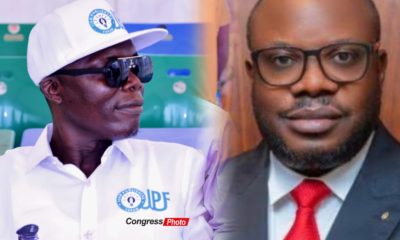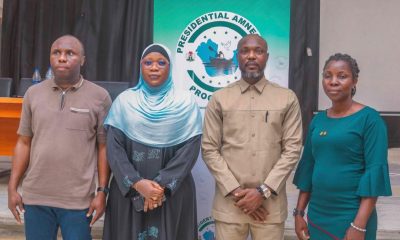Opinion
Reinventing Amnesty: Otuaro’s First-Year Footprints in Niger Delta Development
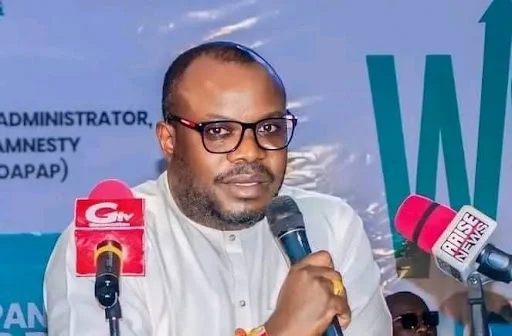
By Julius Ogunro
It is barely over a year since Dennis Otauro, PhD, was appointed as the Administrator of the Presidential Amnesty Programme. Still, in that short time, his impact as the region’s strong voice, advocate, and the president’s outreach arm, bringing hope and development to the Niger Delta, has grown significantly.
When he was appointed in March 2024 by President Bola Tinubu, his designated beat was the Presidential Amnesty Programme (PAP), which was established in 2009 to manage the disarmament, rehabilitation, and reintegration of frustrated Niger Delta activists, some of whom had taken up arms against the government to protest the region’ economic marginalization and the degradation of its environment by oil exploration.
From 2009 until March 2024, the amnesty programme was led by several administrators, who bore different titles and did their best to achieve its mandate of peace and security in the Niger Delta through the payment of stipends to ex-agitators and the provision of vocational and formal education opportunities to members of the communities impacted by the militancy.
Then enter Otuaro. His vision for the Programme is bold, transformative, and inclusive. Apart from the agitators who are on the government payroll, he has refocused the amnesty programme to capture the next generation of Niger Delta leaders, expanding its frontiers to cater to the interests of a range of stakeholders, especially women and young people.
His strategy centres around a broad range of initiatives designed by him and his team to foster enduring peace and prevent any resurgence of militancy in the Niger Delta region. One of these is the Programme’s intervention in expanding education opportunities, especially the scholarship scheme for undergraduates from the Niger Delta.
Although Otuaro did not initiate the undergraduate scholarships scheme, which had existed for many years before his appointment, he has so reinvigorated it that the award, to use a metaphor, has been given a new lease of life.
Before Otuaro, only a few hundred Niger Delta students managed to get the annual scholarships through a cumbersome process, as it was opaque and many had criticised it for being unfair and lacking integrity. Perhaps this was because the previous administrators did not consider education a top priority and viewed the scholarships as not central to their role at Amnesty.
But Otuaro’s vision is different. In his first year as administrator, the undergraduate scholarship scheme has increased from a few hundred students to over 3000. Even more, the award process is now more open and inclusive, starting with a media announcement for interested Niger Delta youth to apply, with assurance that merit will play a significant role in the process.
And merit did play a role in the grant of the scholarships for the current session. Many prospective students applied, did the aptitude tests, and were awarded the multi-year scholarship, which covers tuition, accommodation, and living expenses, with little or no influence from the amnesty office, a far cry from what used to happen in the past, when there were complaints that money had exchanged hands.
In addition, the overseas postgraduate scholarship, suspended by the previous administrators, has been reinstated and broadened. For this current academic session, about 70 Niger Delta postgraduate students were awarded foreign scholarships to universities in the US, Canada, Britain, and other overseas countries. Otuaro made sure that the awardees are pursuing courses that are development-focused and relevant to the material needs of the Niger Delta people.
Otuaro’s footprints are also visible in vocational training. With 98 delegates deployed for maritime-related skills training, including refresher courses at Joemarine Institute for Officer of the Watch (OOW) certification; 40 Niger Delta youth trained as aircraft maintenance engineers; another 39 deployed for on-the-job training at organisations like Seven Star Global Hangar and Aero Contractors; and four cadet pilots sent to South Africa for type-rating training, with successful graduation and return to Nigeria.
The focus on human development and young people appears to be a genius move by the administrator of the amnesty programme, and a strategy to stop future militancy before it even happens. In the mid-1990s and early 2000s, the Niger Delta boiled as several groups took up arms against the government and oil companies to protest the neglect of the region, which is the goose that lays Nigeria’s golden egg, as nearly all the oil exploration and production take place there.
Pipelines were destroyed, workers kidnapped, and oil production was significantly disrupted, leading to huge economic losses for Nigeria and the oil companies operating in the region. The militancy also led to a humanitarian crisis, with many communities suffering from the effects of oil spills, environmental degradation, and violence. The dire situation drew global attention and concern, which highlighted the need for a comprehensive approach to addressing the root causes of the conflict and promoting sustainable peace and development in the Niger Delta region.
The federal government’s response was the amnesty programme in June 2009. Over three years, up to 2012, three phases of the programme were declared to reintegrate thousands of armed militants and pacify the region. It has been over a decade and a half since the first phase of the amnesty scheme began, and many of the beneficiaries are thus getting old and have probably lost the appetite for armed struggle.
Yet the conditions that gave rise to the uprising still exist, despite the government’s efforts over the years. The fear is that those challenges may breed the next generation of militants, angry over the prevalence of poverty and underdevelopment of the Niger Delta.
That is why Otuaro’s strong intervention in human development in the Niger Delta, through various initiatives in formal and non-formal education, is brilliant and commendable. That he has implemented the schemes openly and transparently, thus giving the son of a fisherman and the daughter of a boat-maker in the creeks a chance to make something of themselves, is nothing short of transformative, providing hope and opportunities to the overlooked voices.
And he has done all this while not neglecting the original agitators on the government payroll, ensuring they are paid promptly, resolving challenges related to payment delays, offering suitable training to wean them off government handouts, and advocating for qualified beneficiaries’ placement in jobs in the public service.
Otuaro’s impact in just one year is visible and enduring. An asset to the current administration, he is proof that government in its purest form is not merely an idea or an institution on paper but a living presence, something that can be seen, heard, and felt in the everyday lives of the people.
Opinion
“Delta: Worst in Educational Institutions Distribution” – Mulade Declares as He Calls for Ijaw Inclusion
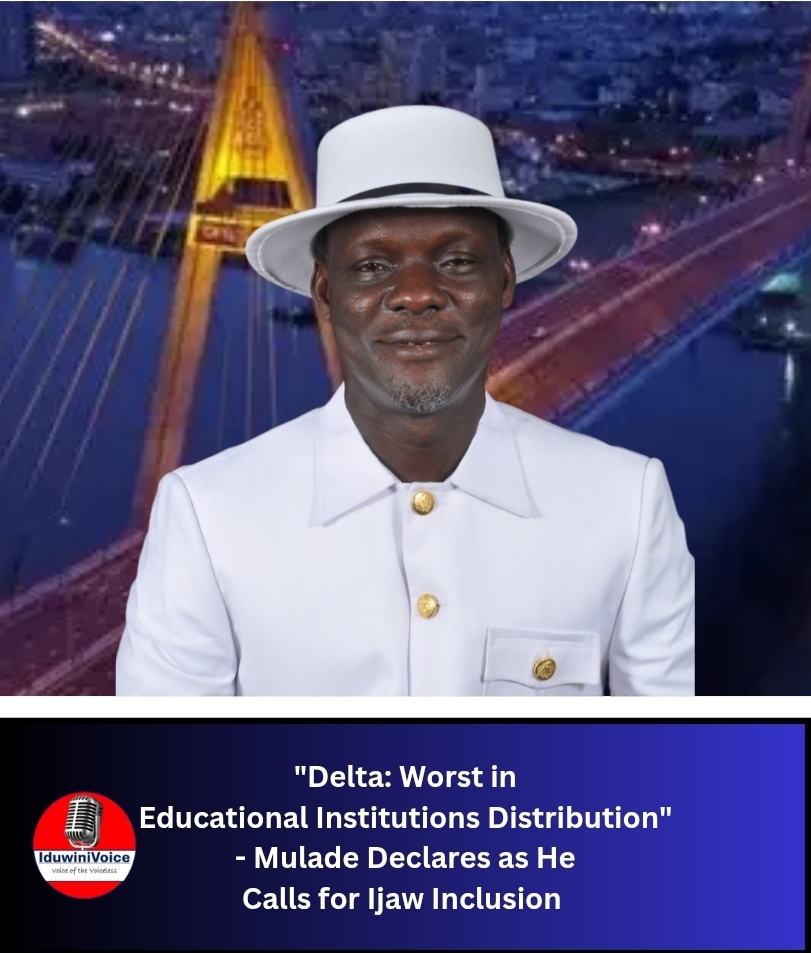
By: Favour Bibaikefie
A development Ijaw leader and development advocate, Comrade Mulade Sheriff, PhD, has accused the Delta State Government of systematic marginalisation and deliberate neglect of Ijaw communities, particularly in the area of educational development and institutional presence.
Mulade, who described the situation as “unjust, provocative and unacceptable in a democratic society,” said the continued exclusion of Ijaw areas from the siting of state-owned educational institutions represents a clear case of structural discrimination, despite the region’s enormous contribution to the economic survival of Delta State.
Dr. Mulade, “It is painful and unacceptable that a people whose land produces greater portion of wealth sustaining this state are treated as second-class citizens when it comes to development especially in the area of higher educational institutions. This is not only unfair; it is dangerous for the unity and future of Delta State.”
The Ijaw-born activist listed the existing state-owned tertiary institutions in Delta State and pointed out that almost all are concentrated outside Ijaw territories, reinforcing a long-standing pattern of exclusion as regards State-Owned Universities such as:
– Delta State University, Abraka;
– Southern Delta State University of Science and Technology, Ozoro; Southern Delta University of Science and Technology, Orerokpe Campus;
– Dennis Osadebay University, Asaba;
– University of Delta, Agbor;
– State-Owned Colleges of Education and Health Institutions:
– Federal College of Education (Technical), Asaba;
– College of Education, Edjeba Road, Warri;
– Delta State College of Physical Education, Mosogar;
– School of Midwifery, Asaba;
– State School of Nursing, Edjeba, Warri;
– College of Nursing Science, Sapele;
– Delta State-Owned Polytechnic Institutions:
– Delta State Polytechnic, Ogwashi-Uku;
– Delta State Polytechnic, Otefe-Oghara;
– Delta State Maritime Polytechnic, Burutu; (with the poorest infrastructure and lacks).
Mulade stressed that out of all these institutions, only one, the Delta State School of Marine Technology, Burutu is located in Ijaw land, a reality he described as “appalling, insulting and indefensible.”
“One institution for an entire ethnic nationality that contributes massively to Delta State’s oil wealth is not just marginalisation; it is a deliberate policy of neglect,” he declared.
The rights activists further lamented that while Ijaw communities bear the environmental burden of oil exploration including polluted rivers, destroyed farmlands and health risks, they are consistently denied the benefits of development, especially in education.
“Our youths are denied opportunities not because they lack potential, but because the government has refused to bring development to our doorsteps. This imbalance is breeding frustration, and must be corrected urgently,” Mulade warned.
The Ibe-Sorimowei of the ancient and oil-rich Gbaramatu Kingdom in Delta State, Chief Mulade Sheriff strongly appealed and called on Governor Sheriff Oborevwori to rise above politics, sentiment and take deliberate steps to correct the imbalance by prioritising the siting of new educational institutions in Ijaw areas, upgrading existing infrastructure and appoint qualified Ijaw sons and daughters as Vice-Chancellor and other principal officers in Delta educational architecture as compensation now.
“Governor Oborevwori must show that he is a governor for all Deltans, not for a select few. The Ijaw people deserve fairness, inclusion and respect. Educational development is not a favour; it is our right,” he stated.
He warned that continued neglect of Ijaw areas could deepen feelings of alienation and undermine the sense of belonging among the people.
Demand for Equity and Justice
Mulade concluded by calling on civil society groups, traditional rulers, youth organisations and stakeholders across Delta State to speak out against structural injustice and demand a more equitable distribution of development.
“This is not just an Ijaw issue; it is a justice issue. A state cannot develop sustainably when a significant part of its population is consistently excluded,” he said.
Opinion
Ijaw Nation Is Watching Delta State 2026 Budgetory Allocations – Dr. Mulade Warns
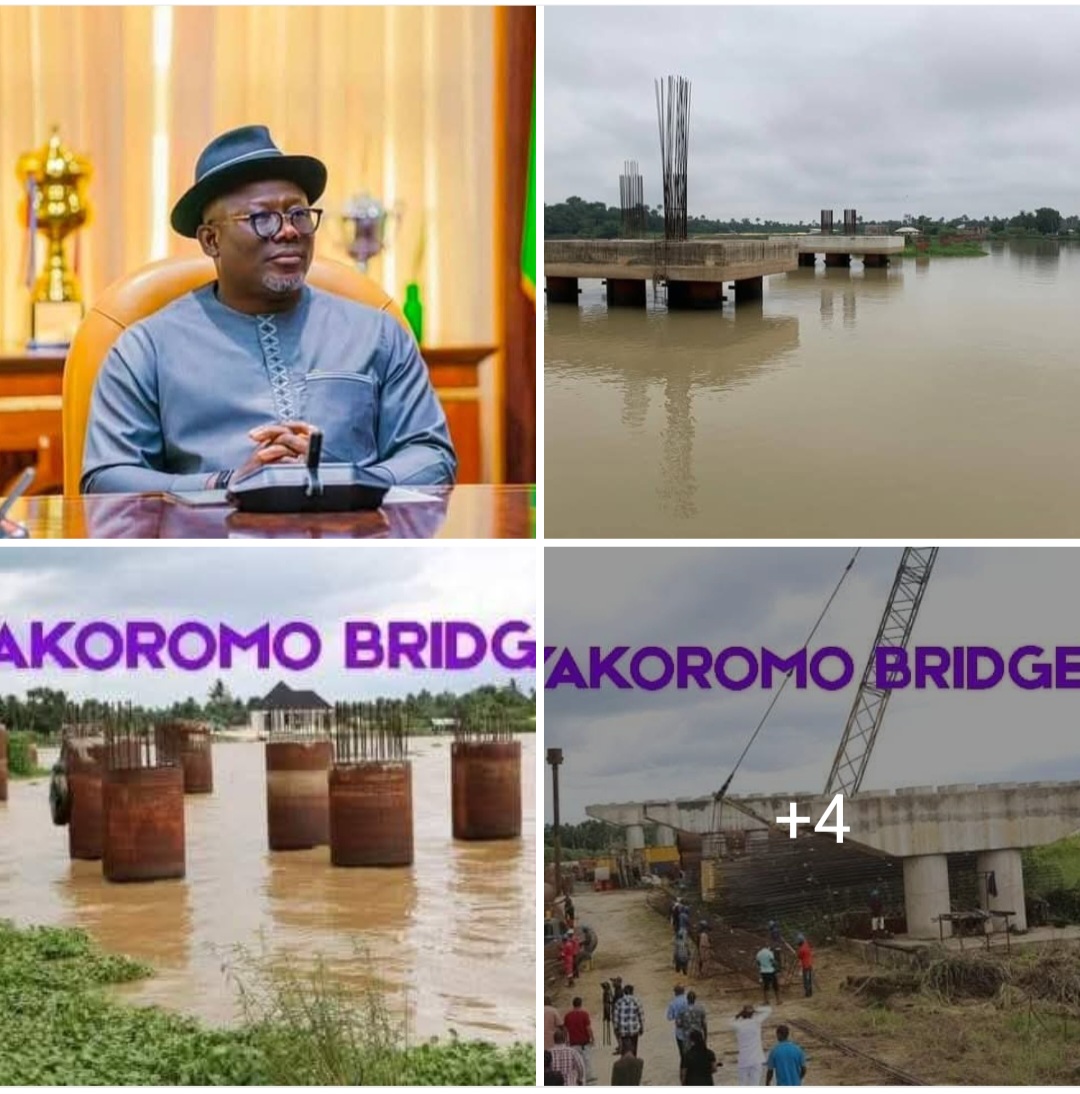
* As Group Gears Up to Endorse Governor Sheriff Oborevwori for 2027
By: Divine Perezide
Ahead of the 2027 general elections gradually inches closer, the political terain have seen a lot of endorsements at various levels. In Delta, there have been reports of a planned endorsement of governor Sheriff Oborevwori as the sole candidate by a group of Delta Ijaws. This has however, triggered reactions from many stakeholders, including a prominent Ijaw leader, peace and development advocate, Comrade (Chief) Mulade Sheriff, PhD, who has declared that Ijaw votes in 2027 would be determined by projects allocated, adequately funded to completion in the 2026 budget.
The renowned human and environmental rights activist made the declaration at a press briefing after an expanded stakeholders meeting in Warri on behalf of Ijaw Ethnic Nationality in the state.
According to the Ibe Sorimowei of the ancient Gbaramatu Kingdom, the adequate inclusion and funding of projects in the riverine areas will serve as critical consideration for political support, and riverine communities predominantly occupied by the Ijaws and Itsekiri ethnic nationalities.
While he commended the infrastructural development stride by governor Oborevwori in the upland areas, Mulade however lamented the absence of such infrastructural revolution in the riverine areas of the state despite the population density and huge revenue contributions to the state as host to multinational oil and gas companies.
He said, “I want to sincerely appreciate His Excellency, Rt. Hon. Sheriff Oborevwori, for the infrastructural development, which I described as infrastructural revolution in the state, particularly in the upland, and your proposed commissioning of the reconstructed Odimodi-Ogulagha road earlier constructed by SPDC in the 1980’s for their operational convenience and community residents.
“It is imperative to state that some Ijaw communities such as Ogulagha, Torugbene, Oporoza, Akugbene, Ojobo etc. are more densely populated than some local government headquarters in the upland, but they are deliberately deprived of development because of the so-called claim of terrain challenges.
“These communities host multinational oil and gas companies contributing immensely to the state revenue, but without any significant projects,” he lamented.
The Ibe-Sorimowei who reminded the governor of how the Ijaws adopted, supported and stood by him all through the election season, also gave the assurance of massive Ijaw votes come 2027, but one that must be backed by the governor’s commitment to development through massive projects inclusion for the area.
“We (the Ijaws) have created a conducive atmosphere to boost oil and gas production, making Delta the richest state; support security, douse restiveness and support economic stability. It is time for the governor to reciprocate through the 2026 budget with tangible legacy projects,” he asserted.
Speaking further he said, “Your Excellency, permit me to draw your attention to some expected critical projects that must be considered for the Delta Ijaw nation: the Ayakoromo bridge, Omadino-Okerenkoko-Kokodiagbene-Escravos road, Aladja-Ogbe-Ijoh Road, Ojobo-Torugbene road, among others.
“Build a first class Health Centre/General Hospital in riverine community, particularly at Ogulagha Town, to compensate the people for their huge contributions to the state revenue.
On education, he appealed that, “It is worthy of note that every ethnic group in Delta State hosts state university except the Ijaws and the Itsekiris. I want to strongly and sincerely appeal to His Excellency, Rt Hon Sheriff Oborevwori once again, to consider the upgrading of the Delta State Maritime Polytechnic, Burutu, which is a moribund polytechnic, to a campus of the Delta State University, Abraka. This will position the state to explore the blue economy opportunities. Equally too, the state government should, without delay, build a campus of Dennis Osadebe University at Koko to give sense of belonging to the Itsekiris with a special focus on agriculture for Deltans.
“The above mentioned projects constitutes significant live-wire for the Delta Ijaw, and will translate into votes come 2027. We can assure His Excellency, Rt Hon Sheriff Oborevwori, of 100 percent of the entire Ijaw votes come 2027.
“The consideration of revolutionary projects in the riverine areas in the 2026 budget will give a sense of belonging to the people for their huge contributions. Moreover, your commitment to development will write your name in gold, not just seeking their votes during elections.”
Opinion
“Tompolo: A Movement of Transformation” – Prof. Binebai,

“Tompolo: A Movement of Transformation” – Prof. Binebai,
IduwiniVoice
Renowned Delta-born Professor of Professor of Drama, Dramatic Theory and Criticism, and an Auratorial god, Prof. Benedict Binebai has yet described High Chief Dr. Government Oweizide Ekpemupolo, popularly known as Tompolo as ‘A Movement of Transformation”
In his words, “Tompolo is a multifaceted entity, a veritable institution that defies categorisation, embodying a dynamic force that permeates various aspects of society. As an agency, it represents a powerful catalyst for change, driving progress and innovation in its wake. As a model, Tompolo exemplifies excellence, demonstrating a paradigm of leadership that is at once inspiring and aspirational. His influence extends far beyond the realm of politics, permeating the cultural, religious, and spiritual spheres, where he fosters a sense of unity and shared purpose.
“As a movement, Tompolo is a seismic force, shaking the foundations of complacency and stagnation, and galvanising individuals to strive for a brighter future. His impact is felt across generations, as he empowers young and old alike to become agents of positive change in their communities. In the realm of politics, Tompolo’s leadership has been characterised by a commitment to justice, equality, and the empowerment of the marginalised. His vision for a more equitable society has inspired countless individuals to work towards a common goal, forging a sense of solidarity and shared humanity.
“Culturally, Tompolo has been a luminary, celebrating the rich diversity of Nigerian heritage while promoting a sense of national identity and pride. His influence has helped to preserve traditional values while embracing modernity, creating a unique blend of old and new. Spiritually, Tompolo’s message of hope and redemption has resonated with people from all walks of life, offering a sense of solace and comfort in times of uncertainty. His leadership has embodied a sense of compassion and empathy, inspiring a new generation of spiritual leaders to follow in his footsteps.
“In every sense, Tompolo is a transformative force, a shining example of what can be achieved through dedication, perseverance, and a commitment to the greater good. He is an impeccable movement because his philosophy, his love for society, his cultural activism, his religiosity and leadership grace and skill which is human centered is attracting a large followership, particularly in the Nigerian Delta, where his impact is deeply felt.”
This assertions resonates well with popular sentiments held not just across the Delta of Nigeria but far beyond. Tompolo’s increasing popularity waxes stronger on the pillars of his dedication to homemade ijaw naturality, largeheartedness, stern capability in securing critical national economic assets and the environment, and above all, a detribalized collaborative efforts with other critical stakeholders within and outside the Niger Delta for peace, stability, infrastructural development, and economic process.
(c) IduwiniVoice





